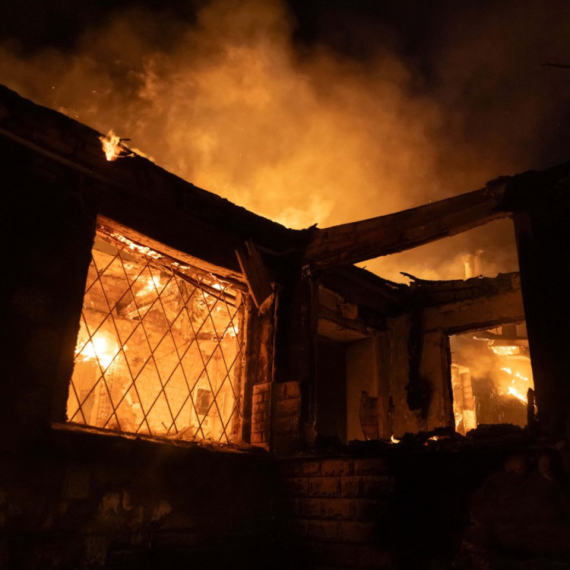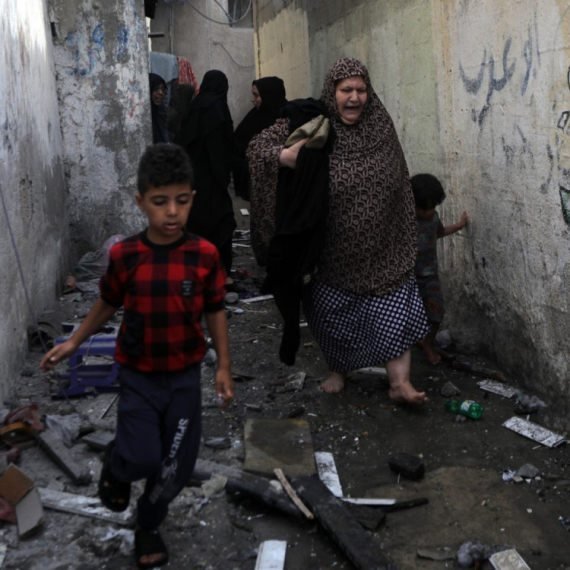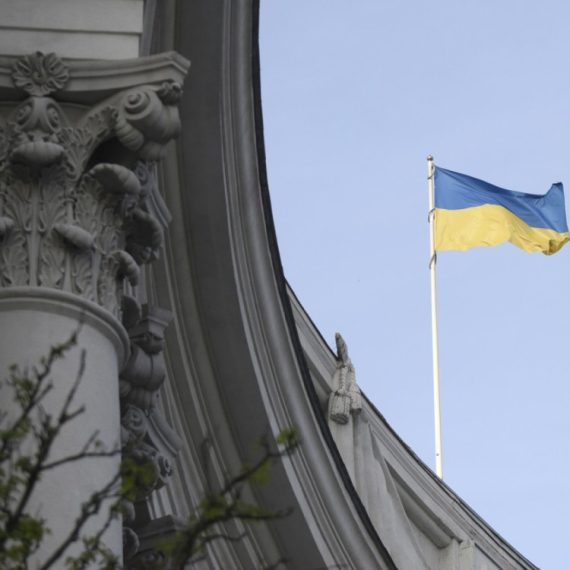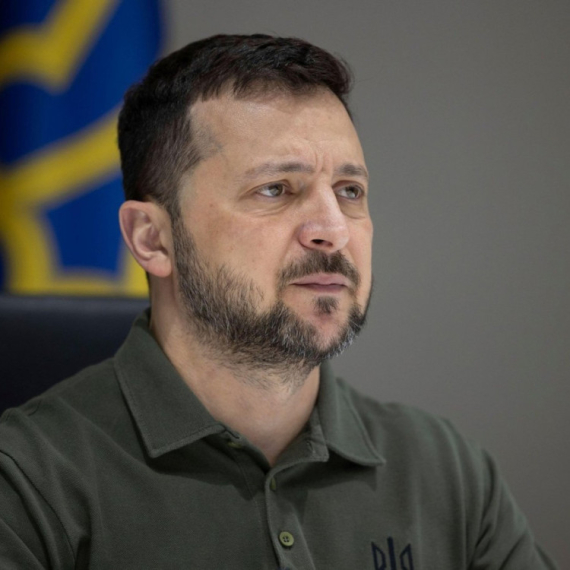K. Serbs remember their dead in desecrated cemeteries
Kosovo Serbs yesterday marked Zadušnice, a religious holiday dedicated to the souls of the dead.
Sunday, 02.03.2008.
10:54

Kosovo Serbs yesterday marked Zadusnice, a religious holiday dedicated to the souls of the dead. Orthodox Christian Serbs observe four such days each year, when families visit cemeteries to light candles and say prayers at the graves of their loved ones. K. Serbs remember their dead in desecrated cemeteries For many Serbs in Kosovo, especially those whose relatives were buried in cemeteries that are now located in ethnic Albanian communities, observing the holiday has since 1999 been a practice that endangered their personal safety, but also brought with it a particular heartbreak – that of finding the grave of a loved one desecrated. Serb Orthodox cemeteries and chapels located at the grounds are regularly vandalized, with tombstones broken and crosses ripped out, while those visiting the graves are escorted by UNMIK police. The divided town of Kosovska Mitrovica is one such example – while the northern majority-Serb part has some Albanian and Bosniak inhabitants, no Serbs live in the southern, Albanian part. But the Serb cemetery is located south of the Ibar River, which divides the troubled town. Yesterday, UNMIK and Kosovo police escorted some 400 Serbs from the north to the graveyard. As has been the case in the past eight years, they found it desecrated and derelict. Reports said that approximately 80 percent of the Orthodox tombstones there have been vandalized. "Albanian gravestones look brand new compared to ours, which are almost all destroyed, especially lately. The only reason why a tombstone can bother someone is if they mean to destroy any sign that we ever existed here," Nenad Milenkovic, a Serb from northern Kosovska Mitrovica, said after visiting the graves of his parents. Bisenija Kovacevic, who lost her husband 12 years ago, said that while she used to be able to go to his grave each week, this is now only possible when armed escort is organized. "What hurts the most is that I can't visit his grave freely when I feel the need to. There's nothing worse than arriving to find a grave that no longer has a headstone," she said. More that 500 Serb graves have been desecrated since 1999, when the new burials there stopped. The Albanian cemetery in the northern part of the town, agencies reported, is not damaged. A similar scene is reported in the Serb graveyard in Pristina. Some Serbs are considering moving the remains of their family members out of the Pristina cemetery and to the places where they can be properly protected. Only around 20 Serbs yesterday braved visiting the graveyard, to quickly light candles and remove the grass and weed from the neglected graves. Ilija Trajkovic of Pristina, now displaced and living in the Serb enclave of Gracanica, came to the cemetery in a UN vehicle Saturday. He says the scene he and his wife find each time they arrive is "more and more horrible". "This here looks horrible. Each time we find new tombstones broken. If you wish to see the degree of a society's development, come to a graveyard, and it will be obvious," he was bitter. Fear, and the recent ethic Albanians' unilateral declaration of the province's independence, are thought to be the reason why so few Serbs dared to visit the cemetery yesterday. But some, like Snezana Borovic, one of a handful of Serbs who still live in Pristina, says she came, because she is "not afraid to die". The perimeter around the Serb Orthodox cemetery in Pristina was secured by KFOR soldiers and members of the Kosovo police. A Serb woman looks at a broken headstone in the south Kosovska Mitrovica cemetery (Tanjug)
K. Serbs remember their dead in desecrated cemeteries
For many Serbs in Kosovo, especially those whose relatives were buried in cemeteries that are now located in ethnic Albanian communities, observing the holiday has since 1999 been a practice that endangered their personal safety, but also brought with it a particular heartbreak – that of finding the grave of a loved one desecrated.Serb Orthodox cemeteries and chapels located at the grounds are regularly vandalized, with tombstones broken and crosses ripped out, while those visiting the graves are escorted by UNMIK police.
The divided town of Kosovska Mitrovica is one such example – while the northern majority-Serb part has some Albanian and Bosniak inhabitants, no Serbs live in the southern, Albanian part.
But the Serb cemetery is located south of the Ibar River, which divides the troubled town. Yesterday, UNMIK and Kosovo police escorted some 400 Serbs from the north to the graveyard. As has been the case in the past eight years, they found it desecrated and derelict.
Reports said that approximately 80 percent of the Orthodox tombstones there have been vandalized.
"Albanian gravestones look brand new compared to ours, which are almost all destroyed, especially lately. The only reason why a tombstone can bother someone is if they mean to destroy any sign that we ever existed here," Nenad Milenković, a Serb from northern Kosovska Mitrovica, said after visiting the graves of his parents.
Bisenija Kovačević, who lost her husband 12 years ago, said that while she used to be able to go to his grave each week, this is now only possible when armed escort is organized.
"What hurts the most is that I can't visit his grave freely when I feel the need to. There's nothing worse than arriving to find a grave that no longer has a headstone," she said.
More that 500 Serb graves have been desecrated since 1999, when the new burials there stopped. The Albanian cemetery in the northern part of the town, agencies reported, is not damaged.
A similar scene is reported in the Serb graveyard in Priština. Some Serbs are considering moving the remains of their family members out of the Priština cemetery and to the places where they can be properly protected.
Only around 20 Serbs yesterday braved visiting the graveyard, to quickly light candles and remove the grass and weed from the neglected graves.
Ilija Trajković of Priština, now displaced and living in the Serb enclave of Gračanica, came to the cemetery in a UN vehicle Saturday. He says the scene he and his wife find each time they arrive is "more and more horrible".
"This here looks horrible. Each time we find new tombstones broken. If you wish to see the degree of a society's development, come to a graveyard, and it will be obvious," he was bitter.
Fear, and the recent ethic Albanians' unilateral declaration of the province's independence, are thought to be the reason why so few Serbs dared to visit the cemetery yesterday.
But some, like Snežana Borović, one of a handful of Serbs who still live in Priština, says she came, because she is "not afraid to die".
The perimeter around the Serb Orthodox cemetery in Priština was secured by KFOR soldiers and members of the Kosovo police.


























































Komentari 14
Pogledaj komentare